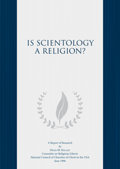Several observations emerged repeatedly, uniformly and saliently:
1. Scientology has become very important in the lives of those interviewed. It occupies a very central, and apparently very constructive, place in the way they now organize their ideas, their work and their life-plans. Many have gone into Scientology full time (as staff = “clergy”?), while those who have not often devote their vacations or extended leaves from their regular occupations to pursuing further training and counselling in Scientology. Some have gone into private business with other Scientologists (one musician played in a band all the members of which had become Scientologists!).
2. Scientology has provided for some a “way out” from drug addiction, alcoholism, frustration, aimlessness, depression, or a sense of futility—no easy task. (One young man described himself as having been a “druggie” relying on crime to support his heavy drug habit, but gave up crime, got a job to pay for his Scientology courses, and abandoned drugs completely. Several others reported having gotten out of drugs after being told they could not continue in Scientology if they took drugs.)
3. A central element in the effect on them which Scientology has had was their conviction that they are “spiritual beings” who have an ongoing existence independent of body or mind, and that consequently there is no need to fear death, which is simply the “dropping” of the current body, to be replaced in time by another body.
4. Their attitude toward Scientology was generally quite utilitarian: it had “worked” for them in improving their ability to cope with day-to-day problems of interpersonal relationships, communication, self-awareness, etc. Even the more “spiritual” aspects (their word) were viewed pragmatically: “If it doesn’t work for you, forget it.” Only those teachings were considered to be true that proved out in the individual’s own experience, and some had not (yet?) reached a level of “spiritual” discovery. (One young man commented that he had “heard about” reincarnation, but it wasn’t something he found particularly useful or important for himself.)
5. The process of “auditing” (counselling carried on with the counselee holding a conductor in each hand attached to an “E-Meter” (Wheatstone bridge) that registers fluctuations in galvanic skin conductivity believed to be connected with the subject-matter of the counselling) was very central to their experience of Scientology, and several described it as a practice of “confession.” They seemed to feel that it was highly therapeutic, and that one could not deceive the E-Meter, thus making auditing superior to other forms of counselling.
6. References to “ethics” cropped up frequently in the interviews, though usually without any very clear-cut or conventional content.
7. References to conventionally “religious” aspects of Scientology—the chapel, ordination, clerical garb, the cross-like symbol, etc.—seemed distinctly peripheral. (“Oh yes, now that you mention it, we do have Sunday services.”)
8. References to the Founder, L. Ron Hubbard, were frequent and adulatory, one might almost say “devout”: his pictures are everywhere; he is the author of most of the vast compendium of material that Scientologists study; there is reserved for him in every Scientology facility a vacant but well-appointed office, with his “Commodore’s” gold-braided hat sitting on the desk.
9. References to respondents’ former religious affiliations and to other religions were usually respectful, and the point was made repeatedly that Scientology is compatible with other religions; it simply “applies” what in other religions is apparently thought to be only theoretical. Some respondents said they were still Lutherans or Methodists, but evidently not actively so. Most described themselves as being “Scientologists” rather than, and instead of, being adherents of some (other?) religion.
10. Many reported that they had been dissatisfied with previous religions because their questions had not been answered satisfactorily. They had often been told what to believe but had not directly experienced the answers to their questions, and so remained “seekers” until they came into Scientology, where they were not given answers or told what to believe, but were enabled to discover answers through their own experience, which apparently satisfied their need. They referred repeatedly to the “Eighth Dynamic,” less often to “God” or a “Supreme Being” to whom one is said to relate in the “Eighth Dynamic,” but made clear that Scientology does not provide a definition of God or specific content for the “Eighth Dynamic,” leaving that to the individual to discover.
11. Some reported having solemnized marriages for other Scientologists or to have had their own marriages solemnized by Scientology “clergy.”





























